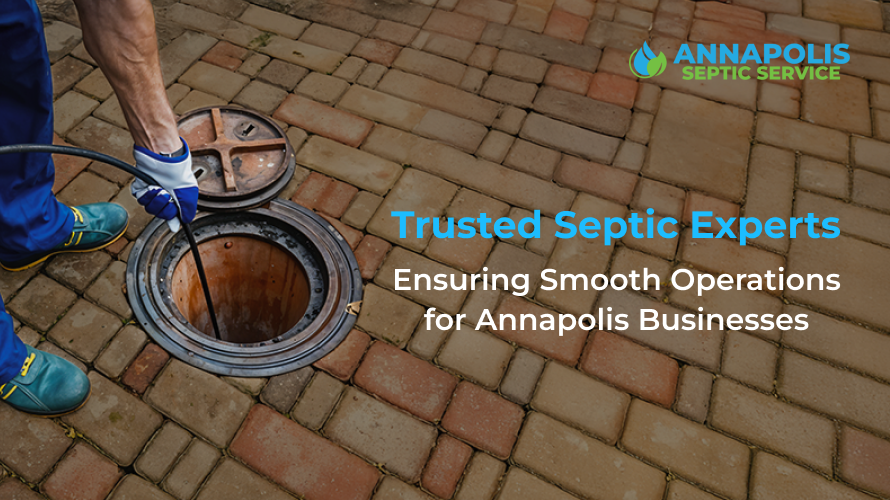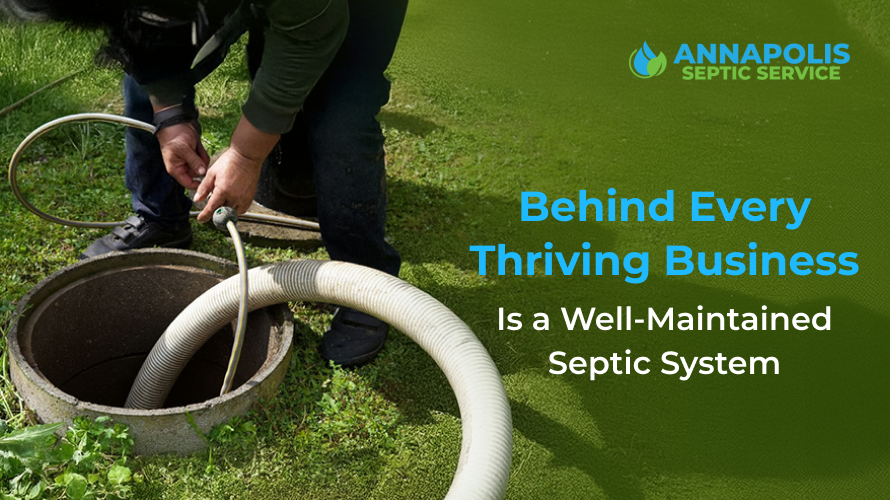Running a business in Annapolis involves juggling numerous moving parts, including staff, customers, schedules, and facilities. But one system that often gets overlooked until something goes wrong is the septic system. For many local businesses, especially those outside the city’s main sewer lines, a well-functioning septic system is crucial for maintaining smooth and hygienic operations.
When issues arise, they can disrupt productivity, cause unpleasant odors, and lead to expensive repairs. That’s why commercial septic maintenance isn’t just a good idea; it’s a necessity. Regular maintenance helps prevent backups, extends the lifespan of your system, and ensures your business remains compliant with environmental regulations.
Let’s explore five practical, easy-to-follow tips to help you stay ahead of problems and keep your septic system running efficiently year-round.
1. Schedule Routine Inspections and Pumping
The first rule of commercial septic maintenance is consistency. Your system requires regular inspections and pumping to stay in optimal condition. Depending on the size of your tank, the number of employees, and the nature of your business, you may need servicing every six months to a year.
A licensed technician can inspect for issues such as leaks, blockages, or excessive sludge buildup. During commercial septic cleaning, solid waste and grease are removed to prevent clogs and system overloads, thereby maintaining optimal system performance. Neglecting these cleanings can lead to backups or damage to the drain field, problems that are both messy and expensive to fix.
Restaurants, hotels, and manufacturing facilities, in particular, generate more waste and grease, necessitating more frequent maintenance. Staying on top of your service schedule is the best way to prevent unpleasant surprises later.
2. Train Staff on Proper Waste Disposal
Even the best-maintained commercial septic systems can run into trouble if people aren’t careful about what goes down the drains. Employee awareness plays a huge role in preventing blockages and overflows.
Train your staff to avoid flushing paper towels, wipes, or feminine hygiene products down toilets. Similarly, in kitchens or break rooms, ensure that cooking grease, oil, or coffee grounds aren’t poured down sinks. Over time, these materials can clog pipes and cause grease traps to overflow, forcing your system to work harder.
Posting clear signage near sinks and restrooms can be a helpful reminder for everyone. A little education goes a long way in protecting your septic system and avoiding costly repairs.
3. Monitor Water Usage and Fix Leaks Quickly
Excessive water flow can overwhelm your septic tank, reducing its ability to treat waste properly. Businesses that use a significant amount of water, such as hotels, laundromats, and restaurants, should pay special attention to their fixtures.
Keep an eye out for dripping faucets, leaking toilets, or running dishwashers. Even small leaks add up quickly, sending hundreds of extra gallons of water into the system every day. This dilutes the bacterial balance inside your septic tank, prematurely pushing solids into the drain field.
Monitoring water use and promptly addressing leaks can significantly reduce strain on your commercial septic systems. Water-saving fixtures and regularly checking for hidden leaks are smart steps toward maintaining balance and efficiency.
4. Don’t Skip Drain Field Care
Many business owners assume septic maintenance stops at the tank, but your drain field is just as important. The drain field is where liquid waste is filtered and absorbed into the ground; if it’s neglected, your entire system can fail.
Ensure the area above your drain field is treated with care. Avoid parking vehicles, building structures, or planting deep-rooted trees in the vicinity. Heavy pressure can compact the soil and damage the buried pipes, while invasive roots can block or rupture the lines.
During commercial septic tank maintenance, professionals often check the drain field’s condition to ensure proper filtration and absorption. If you notice pooling water, soggy patches, or foul odors near the area, it could be a sign that your drain field needs attention.
Maintaining this part of your system not only protects your business property but also helps the environment by ensuring wastewater is properly filtered before reentering the soil.
5. Keep Detailed Maintenance Records
When it comes to managing your septic system, documentation is your most valuable asset. Keeping detailed records of every commercial septic cleaning, inspection, and repair makes it easier to track performance and identify patterns.
If something goes wrong, these records help technicians understand your system’s history and diagnose issues faster. They also demonstrate compliance with health and safety regulations, especially important for food service and hospitality businesses in Annapolis.
Store copies of your pumping schedules, inspection reports, and any maintenance receipts in one place. This simple habit ensures you never miss a service and gives you peace of mind that your system is in good standing.
Why Commercial Septic Maintenance Matters
It’s easy to forget about your septic system when it’s working perfectly, but that’s exactly when maintenance is most important. Regular care prevents small issues from escalating into major problems, protecting your property and maintaining a strong business reputation.
For Annapolis business owners, professional commercial septic maintenance means fewer emergencies, improved sanitation, and a longer lifespan for their septic systems. It’s an investment in your operations, your staff, and your customers’ comfort.
Whether you manage an office complex, restaurant, or retail property, every business benefits from preventive maintenance. It’s the difference between paying for affordable routine service and facing unexpected, costly system failures down the road.
When to Call for Professional Help
Even with regular maintenance, there are times when it’s best to bring in an expert. Call a professional septic technician if you notice any of the following warning signs:
- Slow-draining sinks, toilets, or floor drains
- Unpleasant odors inside or outside your building
- Pooling water or soggy soil near your drain field
- Gurgling sounds from fixtures
These are red flags that your system may be clogged, overloaded, or leaking, and waiting too long could exacerbate the issue. A licensed professional can assess the situation and perform the necessary commercial septic cleaning or repairs before major damage occurs.
Reliable Septic Maintenance for Annapolis Businesses

Your septic system might be out of sight, but it should never be out of mind. Consistent, professional commercial septic maintenance is one of the smartest steps you can take to keep your business running smoothly. From inspections and cleaning to recordkeeping and drain field care, each small effort adds up to big savings and peace of mind.
At Annapolis Septic Service, we recognize the importance of a reliable, properly functioning septic system for businesses. Our team offers comprehensive maintenance services tailored to the unique needs of commercial septic systems throughout Annapolis. We handle everything from routine pumping to in-depth inspections, ensuring your system performs efficiently throughout the year.
If you want to safeguard your property, protect your investment, and avoid costly disruptions, contact us today to learn more about our commercial septic maintenance services and how we can help keep your business running smoothly.
FAQs
1. How often should a commercial septic system be serviced?
The frequency of commercial septic maintenance depends on your business type, tank size, and the volume of wastewater generated. Generally, it’s best to schedule a professional inspection and pumping every 6 to 12 months. Restaurants, hotels, and other high-volume facilities may require more frequent commercial septic cleaning due to heavier use and grease accumulation.
2. What are the signs that my commercial septic system needs maintenance?
Watch for slow drains, unpleasant odors, or pooling water around your drain field. You may also hear gurgling sounds in your fixtures or notice that toilets are draining slowly. These symptoms suggest your system may be full or clogged, requiring immediate attention. Prompt commercial septic tank maintenance can help avoid costly repairs and prevent disruptions to your business operations.
3. Can my employees help prevent septic problems at work?
Absolutely. Educating your team on proper waste disposal is one of the most effective ways to protect your commercial septic systems. Encourage staff to avoid flushing paper towels, wipes, or grease down sinks and toilets. Even small actions, such as scraping food waste into trash bins instead of the sink, help maintain a healthy ecosystem. Simple staff training and posted reminders can go a long way in reducing issues and extending the life of your septic setup.
4. Why is water conservation important for commercial septic maintenance?
Excessive water usage can overwhelm your septic tank, causing untreated wastewater to flow into the drain field and reduce system efficiency. Businesses that use large volumes of water, such as laundromats or restaurants, should regularly check for leaks and water-saving fixtures. Conserving water helps your commercial septic maintenance plan succeed by maintaining a stable bacterial balance and minimizing strain on your system.
5. What should I do if I suspect a septic system issue at my business?
If you notice foul odors, slow drains, or flooding near your septic system, contact a professional septic technician immediately. Avoid using chemicals or attempting DIY fixes – they can worsen the problem. An experienced professional can perform commercial septic cleaning or necessary repairs safely and efficiently. Timely action can prevent downtime, protect your property, and keep your business running smoothly.

